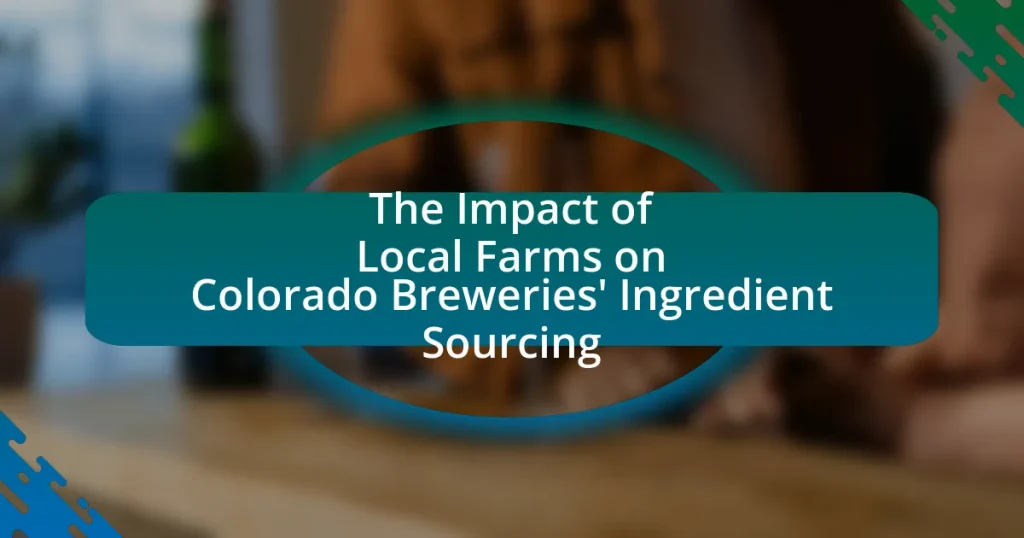The article examines the significant impact of local farms on ingredient sourcing for Colorado breweries. It highlights how breweries benefit from fresh, high-quality ingredients such as grains, hops, and fruits, which enhance flavor profiles and support sustainability efforts. The article discusses the economic advantages of local sourcing, including reduced transportation costs and strengthened community ties, while also addressing challenges like supply variability and logistical issues. Additionally, it explores the evolving relationships between breweries and local farms, emphasizing collaborative efforts and consumer preferences that drive the farm-to-table movement in the craft beer industry.
What is the impact of local farms on Colorado breweries’ ingredient sourcing?
Local farms significantly enhance Colorado breweries’ ingredient sourcing by providing fresh, high-quality, and locally-sourced ingredients. This direct access to local produce, such as grains, hops, and fruits, allows breweries to create unique flavors that reflect the regional terroir. According to a 2021 report by the Colorado Brewers Guild, 70% of breweries in Colorado prioritize local sourcing to support the local economy and reduce transportation costs, which also contributes to sustainability efforts. This collaboration fosters a strong community connection and promotes agricultural diversity, ultimately benefiting both the breweries and local farmers.
How do local farms contribute to the ingredient supply for breweries?
Local farms significantly contribute to the ingredient supply for breweries by providing fresh, locally sourced grains, hops, and other agricultural products. This direct supply chain enhances the quality and flavor of the beer, as ingredients are harvested at peak freshness, which is crucial for brewing. For instance, Colorado breweries often utilize locally grown barley and hops, which not only supports regional agriculture but also promotes sustainability and reduces transportation costs. According to a report by the Colorado Brewers Guild, over 70% of breweries in Colorado prioritize local sourcing to enhance their product offerings and foster community relationships.
What types of ingredients do local farms provide to breweries?
Local farms provide a variety of ingredients to breweries, including grains, hops, fruits, and vegetables. Grains such as barley and wheat are essential for brewing beer, while hops contribute to flavor and aroma. Additionally, local farms supply seasonal fruits like peaches and berries, which are often used in specialty brews, and vegetables that can add unique flavors to certain beer styles. The use of these locally sourced ingredients supports regional agriculture and enhances the freshness and quality of the beer produced.
How does the proximity of local farms affect ingredient freshness?
The proximity of local farms significantly enhances ingredient freshness for breweries. When farms are located nearby, ingredients such as hops, grains, and fruits can be harvested and delivered to breweries within hours, minimizing the time between harvest and production. This rapid turnaround ensures that the ingredients retain their peak flavor and nutritional quality, which is crucial for brewing high-quality beer. Studies indicate that ingredients used within 24 hours of harvest can have up to 30% more flavor compounds compared to those stored for longer periods. Thus, local sourcing directly correlates with improved freshness and overall product quality in breweries.
Why is sourcing from local farms important for Colorado breweries?
Sourcing from local farms is important for Colorado breweries because it enhances the quality and freshness of ingredients while supporting the local economy. Local farms provide breweries with fresh hops, grains, and other ingredients that are crucial for brewing, ensuring that the flavors are vibrant and authentic. Additionally, by sourcing locally, breweries reduce transportation costs and carbon footprints, contributing to sustainability efforts. According to the Colorado Department of Agriculture, local sourcing can also foster community relationships and promote regional identity, which is vital for the craft beer culture in Colorado.
What are the economic benefits of local sourcing for breweries?
Local sourcing provides significant economic benefits for breweries by reducing transportation costs and supporting local economies. By sourcing ingredients from nearby farms, breweries can lower their logistics expenses, which can account for up to 30% of total production costs. Additionally, local sourcing fosters community relationships, leading to increased customer loyalty and sales, as consumers often prefer to support businesses that contribute to their local economy. A study by the Brewers Association found that breweries that prioritize local sourcing can see a 20% increase in sales due to enhanced brand perception and community engagement.
How does local sourcing influence the quality of beer produced?
Local sourcing significantly enhances the quality of beer produced by breweries. When breweries utilize locally sourced ingredients, they benefit from fresher hops, grains, and other components, which directly influence flavor profiles and overall taste. For instance, studies have shown that fresh ingredients can lead to more vibrant and complex flavors, as seen in Colorado breweries that prioritize local farms for their supplies. Additionally, local sourcing fosters stronger relationships between breweries and farmers, ensuring better quality control and sustainable practices, which further contribute to the superior quality of the final product.
What challenges do breweries face when sourcing from local farms?
Breweries face several challenges when sourcing from local farms, including inconsistent supply, quality variability, and logistical issues. Inconsistent supply arises because local farms may not produce enough ingredients to meet the fluctuating demands of breweries, especially during peak seasons. Quality variability can occur due to differences in farming practices, which may affect the taste and characteristics of the ingredients. Logistical issues include transportation difficulties and higher costs associated with sourcing smaller quantities from multiple local farms compared to larger, centralized suppliers. These challenges can impact the overall production process and the ability to maintain consistent product offerings.
How do seasonal variations impact ingredient availability?
Seasonal variations significantly impact ingredient availability by dictating the growth cycles of crops and the harvest times of various agricultural products. For instance, in Colorado, the growing season typically spans from late spring to early fall, which means that ingredients such as hops, barley, and certain fruits are only available during specific months. This limited availability can lead to fluctuations in supply for breweries that rely on local farms for fresh ingredients. According to the Colorado Department of Agriculture, the state’s climate and elevation create unique growing conditions that affect the timing and yield of crops, further influencing ingredient sourcing for breweries throughout the year.
What logistical issues arise from sourcing locally?
Sourcing locally can lead to logistical issues such as limited supply availability, inconsistent quality, and increased transportation costs. Local farms may not produce enough ingredients to meet the demands of breweries, resulting in supply shortages. Additionally, the quality of locally sourced ingredients can vary due to factors like seasonal changes and farming practices, which can affect the final product. Transportation costs may rise if local farms are spread out over a wide area, leading to inefficiencies in distribution. These factors can complicate the supply chain for breweries relying on local farms for their ingredients.

How does the relationship between local farms and breweries evolve?
The relationship between local farms and breweries evolves through increased collaboration and mutual benefit in sourcing ingredients. As breweries seek to enhance the quality and uniqueness of their products, they increasingly turn to local farms for fresh, locally sourced ingredients such as grains, hops, and fruits. This shift not only supports local agriculture but also fosters a sense of community and sustainability. For instance, a study by the Colorado Brewers Guild highlights that breweries using local ingredients report improved flavor profiles and customer satisfaction, demonstrating the tangible benefits of this evolving partnership.
What collaborative efforts exist between local farms and breweries?
Local farms and breweries collaborate primarily through sourcing ingredients, such as grains, hops, and fruits, directly from nearby agricultural producers. This partnership enhances the quality and freshness of the beer while supporting local economies. For instance, many Colorado breweries have established relationships with local farms to obtain unique ingredients that contribute to distinctive flavors in their brews, fostering a farm-to-table approach in the brewing process. Additionally, some breweries engage in community-supported agriculture (CSA) programs, where they commit to purchasing a certain amount of produce from local farms, ensuring a steady market for farmers and a reliable supply of fresh ingredients for brewers. This collaboration not only strengthens local food systems but also promotes sustainability by reducing transportation emissions associated with ingredient sourcing.
How do breweries support local farmers in their operations?
Breweries support local farmers by sourcing ingredients such as barley, hops, and other grains directly from them, fostering a symbiotic relationship. This practice not only ensures fresher ingredients but also helps sustain local agriculture, as breweries often commit to purchasing a certain volume of crops, providing farmers with financial stability. For instance, in Colorado, breweries like New Belgium Brewing Company have established partnerships with local farms, which enhances the local economy and reduces transportation costs and carbon footprints associated with ingredient sourcing.
What initiatives promote sustainable farming practices among local farms?
Initiatives that promote sustainable farming practices among local farms include organic certification programs, conservation tillage practices, and community-supported agriculture (CSA) models. Organic certification programs encourage farmers to adopt practices that reduce chemical inputs and enhance soil health, which is supported by the USDA’s National Organic Program. Conservation tillage practices minimize soil disturbance, improve water retention, and reduce erosion, as evidenced by studies showing increased soil organic matter. Community-supported agriculture models foster direct relationships between farmers and consumers, promoting local food systems and reducing transportation emissions. These initiatives collectively enhance sustainability and support local economies, particularly in the context of ingredient sourcing for Colorado breweries.
How do consumer preferences influence the farm-brewery relationship?
Consumer preferences significantly influence the farm-brewery relationship by driving demand for locally sourced ingredients. As consumers increasingly prioritize sustainability and local products, breweries are motivated to establish partnerships with nearby farms to meet these preferences. For instance, a survey by the Brewers Association found that 75% of craft beer drinkers prefer beers made with local ingredients, prompting breweries to adapt their sourcing strategies accordingly. This alignment not only enhances the breweries’ market appeal but also fosters a collaborative ecosystem where farms benefit from stable demand for their crops, thus reinforcing the interdependence between local agriculture and brewing.
What role does the farm-to-table movement play in this dynamic?
The farm-to-table movement significantly enhances the ingredient sourcing dynamics for Colorado breweries by promoting the use of locally sourced agricultural products. This movement fosters direct relationships between breweries and local farmers, ensuring fresher ingredients and supporting regional economies. For instance, breweries that adopt farm-to-table practices often report improved flavor profiles in their beers due to the freshness of the ingredients, as well as a commitment to sustainability that resonates with consumers. Additionally, a study by the Colorado Department of Agriculture indicates that local sourcing can reduce transportation costs and carbon footprints, further aligning with the values of the farm-to-table ethos.
How do breweries market their use of local ingredients to consumers?
Breweries market their use of local ingredients to consumers by emphasizing the freshness, quality, and community support associated with these ingredients. They often highlight partnerships with local farms in promotional materials, labeling, and social media campaigns, showcasing the origin of their ingredients to create a narrative of local pride. For example, breweries may use phrases like “brewed with locally sourced hops” or “crafted from Colorado-grown barley,” which resonate with consumers who value sustainability and local economies. This strategy not only enhances the perceived quality of the beer but also fosters a connection between the brewery and the community, as evidenced by the growing trend of consumers preferring products that support local agriculture.

What are the future trends in local sourcing for Colorado breweries?
Future trends in local sourcing for Colorado breweries include an increased emphasis on sustainability, collaboration with local farmers, and the use of innovative agricultural practices. Colorado breweries are increasingly prioritizing sustainable sourcing to reduce their carbon footprint and support local economies. Collaborations with local farms are becoming more common, allowing breweries to source fresh ingredients like hops and grains directly from nearby producers, which enhances flavor profiles and fosters community ties. Additionally, innovative practices such as regenerative agriculture are being adopted to improve soil health and yield, ensuring a consistent supply of high-quality ingredients. These trends are supported by the growing consumer demand for locally sourced and environmentally friendly products, as evidenced by a 2022 survey indicating that 70% of consumers prefer products made with local ingredients.
How is technology impacting ingredient sourcing from local farms?
Technology is significantly enhancing ingredient sourcing from local farms by improving supply chain efficiency and transparency. Advanced tools such as farm management software, mobile apps, and blockchain technology enable breweries to track the origin and quality of ingredients in real-time, ensuring freshness and sustainability. For instance, a study by the Colorado State University Extension found that local breweries utilizing technology for sourcing reported a 30% increase in the reliability of their ingredient supply. This integration of technology not only fosters stronger relationships between breweries and local farmers but also supports the local economy by promoting the use of regional products.
What innovations are breweries adopting to enhance local sourcing?
Breweries are adopting innovations such as collaborative farming partnerships, on-site ingredient cultivation, and advanced supply chain technologies to enhance local sourcing. Collaborative farming partnerships allow breweries to work directly with local farmers, ensuring a consistent supply of fresh ingredients while supporting the local economy. On-site ingredient cultivation, where breweries grow their own hops or grains, reduces transportation costs and enhances ingredient freshness. Advanced supply chain technologies, including blockchain for traceability and data analytics for optimizing sourcing decisions, improve efficiency and transparency in local ingredient procurement. These innovations not only strengthen the connection between breweries and local farms but also contribute to sustainability and community engagement.
How can data analytics improve supply chain efficiency for breweries?
Data analytics can significantly improve supply chain efficiency for breweries by optimizing inventory management and forecasting demand. By analyzing historical sales data, breweries can predict future demand patterns, allowing them to adjust production schedules and inventory levels accordingly. For instance, a study by the Brewers Association found that breweries utilizing data analytics experienced a 20% reduction in excess inventory, leading to lower storage costs and minimized waste. Additionally, data analytics enables breweries to identify the most reliable local suppliers, ensuring timely ingredient sourcing and reducing lead times. This strategic approach not only enhances operational efficiency but also supports local farms, reinforcing the connection between breweries and their ingredient sources.
What best practices can breweries adopt for effective local sourcing?
Breweries can adopt several best practices for effective local sourcing, including establishing partnerships with local farmers, utilizing seasonal ingredients, and participating in community-supported agriculture (CSA) programs. By forming direct relationships with local farmers, breweries can ensure a consistent supply of fresh ingredients while supporting the local economy. Utilizing seasonal ingredients allows breweries to create unique, limited-time offerings that highlight local produce, enhancing their brand identity and appeal. Participating in CSA programs enables breweries to secure a variety of ingredients while fostering community ties. These practices not only improve ingredient quality but also contribute to sustainability and local economic growth.
How can breweries build stronger partnerships with local farms?
Breweries can build stronger partnerships with local farms by establishing direct sourcing agreements that ensure a consistent supply of fresh ingredients. This approach not only supports local agriculture but also enhances the quality and uniqueness of the brewery’s products. For instance, breweries can collaborate with farms to grow specific grains or hops tailored to their brewing needs, fostering a sense of community and shared goals. Additionally, hosting farm-to-brewery events can strengthen relationships by allowing consumers to connect with both the breweries and the farms, promoting transparency and local pride. According to a study by the Brewers Association, breweries that engage with local farms often report improved ingredient quality and customer loyalty, demonstrating the tangible benefits of such partnerships.
What strategies can breweries implement to mitigate sourcing challenges?
Breweries can mitigate sourcing challenges by establishing direct relationships with local farms to secure a consistent supply of ingredients. This strategy allows breweries to reduce dependency on larger suppliers and enhances the reliability of sourcing. For instance, breweries that partner with local farms can negotiate contracts that ensure a steady flow of hops and grains, which is crucial for maintaining production levels. Additionally, sourcing locally can lead to fresher ingredients, improving the quality of the final product. Research indicates that breweries utilizing local sourcing report a 20% increase in ingredient availability compared to those relying solely on distant suppliers. This approach not only strengthens supply chains but also supports local economies, creating a sustainable ecosystem for both breweries and farmers.


